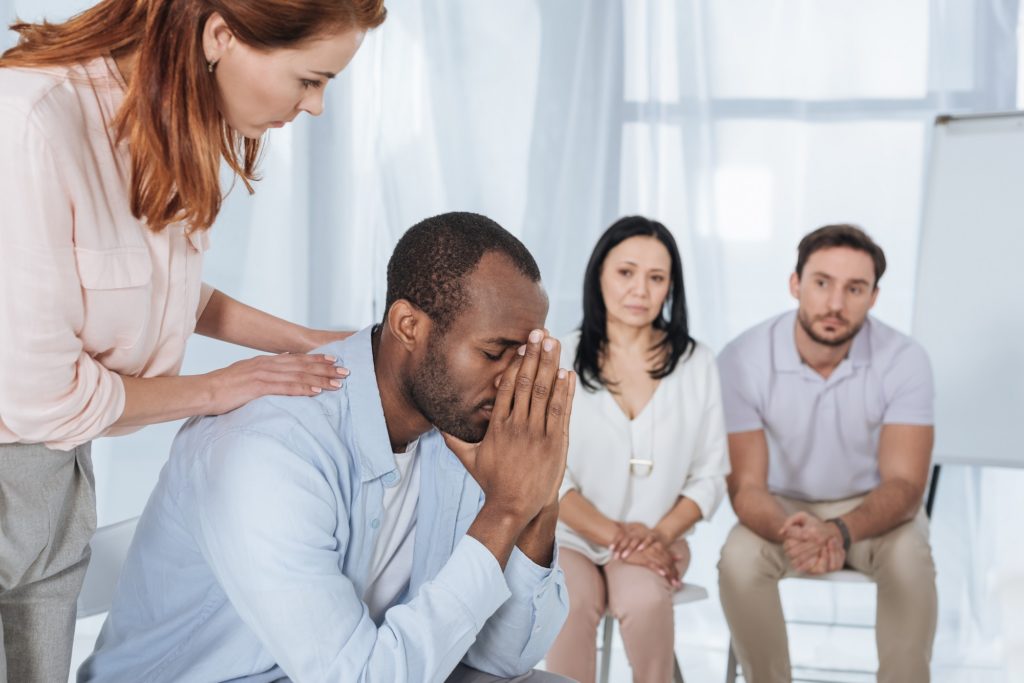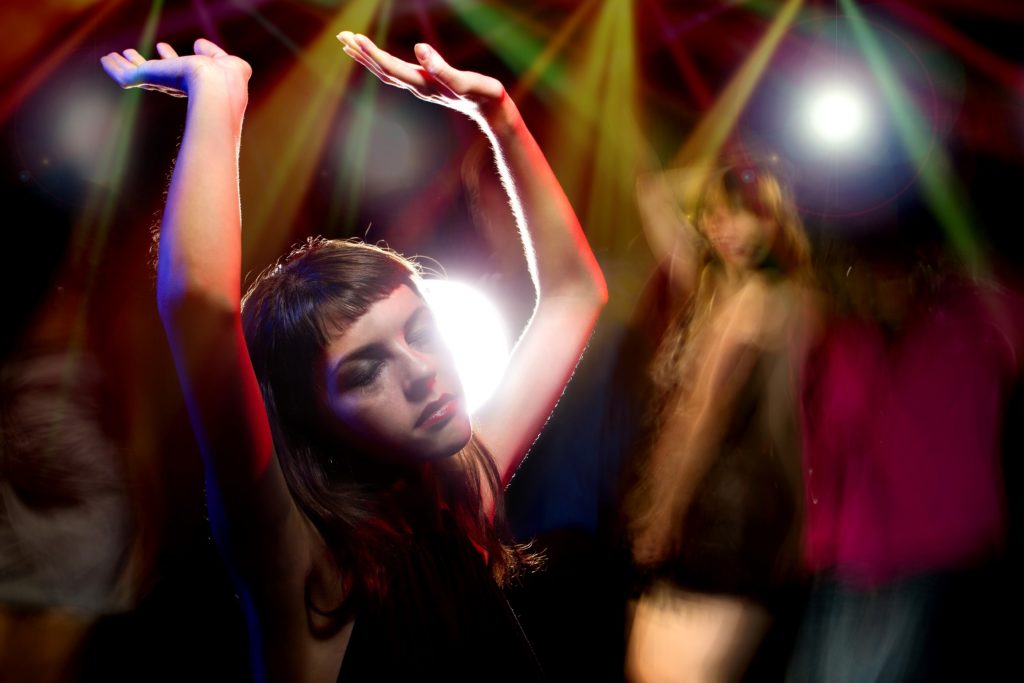CLUB DRUG ADDICTION
Sections: What Are Club Drugs? | Types | Effects | Becoming Addicted | Signs & Symptoms | Withdrawal | Treatment | Hope
WHAT ARE CLUB DRUGS?
Club drugs are a category of psychoactive substances commonly associated with nightclubs, parties, and raves. These drugs are known for their ability to enhance sensory experiences and social interactions, often leading to altered states of consciousness.
While their effects vary, ranging from stimulant to depressant and hallucinogenic properties, club drugs share a common context in recreational, often nighttime, social settings. However, despite their popularity in certain scenes, these substances can pose serious risks, including addiction, which necessitates informed awareness and potential treatment interventions.
THE MANY FACES OF CLUB DRUGS
There are numerous types of drugs that can be found in clubs and at parties, but certain substances tend to be especially common. The following are just a few of the most common club drugs, as well as some of the nicknames for each:
|
Club Drug |
Common Nicknames |
|
MDMA (Methylenedioxymethamphetamine) |
Ecstasy, E, X, Molly |
|
GHB (Gamma-hydroxybutyrate) |
G, Liquid Ecstasy, Liquid X, Everclear |
|
Ketamine |
K, Special K, Super K |
|
Rohypnol |
Roofies, Rophies, Forget Me Pill |
|
Methamphetamine |
Meth, Speed, Ice, Crystal, Crank |
|
LSD (Lysergic Acid Diethylamide) |
Acid, Tabs, Boomers |
Other substances that are sometimes taken at nightclubs include methylphenidate (Ritalin), ephedrine, and piperazines (BZP, TFMPP).
Drugs like rohypnol and GHB are central nervous system depressants, which, unfortunately, makes them popular for “date rape drug” purposes. These are often slipped secretly into a drink, rendering the victim unable to defend against sexual assault.
THE PHYSIOLOGICAL EFFECTS OF CLUB DRUGS ON THE BRAIN AND BODY
Depending on which type of drug a person takes in a club or party environment, the physical and mental side effects can vary drastically. Take a look at a few of club drugs’ physical effects on the brain and body:
|
Club Drug |
Type |
Effects |
|
MDMA |
Stimulant |
Relaxed euphoria, distorted/intensified senses, teeth grinding |
|
GHB |
Depressant |
Hypnotic euphoria, uninhibited behavior, drowsiness, memory problems |
|
Ketamine |
Dissociative |
Strong sense of detachment, hallucinations, confusion |
|
Rohypnol |
Depressant |
Severe drowsiness, memory loss, amnesia, inability to resist sexual assault |
|
Methamphetamine |
Stimulant |
Long-lasting euphoria, increased energy, increased heart rate |
|
LSD |
Hallucinogen |
Intense hallucinations, pupil dilation, shaking, sweating |
Most of these drugs are intended to produce a pleasurable experience that artificially heightens a person’s enjoyment of things like music, dancing, and sex. However, taking these drugs presents a number of dangers as well. With repeated use, a person can easily develop a devastating club drug addiction that destroys their health and relationships. Even first-time users who are not addicted can still have a bad reaction to a drug or overdose accidentally. One time may be all it takes for a drug to derail your life.
ARE CLUB DRUGS ADDICTIVE?
Club drugs possess varying degrees of addiction potential. Understanding these risks is crucial for both prevention and the treatment of substance abuse.
IS MDMA ADDICTIVE?
While MDMA is not as physically addictive as some substances, its euphoric effects can lead to psychological dependence. Rehabilitation centers often address the psychological aspects of MDMA addiction, focusing on emotional and behavioral recovery.
IS GHB ADDICTIVE?
GHB’s high addictive potential can lead to physical and psychological dependence, especially with regular use. Treatment for GHB addiction often involves medically supervised detoxification and comprehensive therapy to address dependency issues.
IS KETAMINE ADDICTIVE?
The ketamine addiction risk, particularly its ability to induce psychological dependence, is a concern. When someone is addicted to ketamine, treatment focuses on the psychological aspects of ketamine abuse, employing therapeutic interventions to help individuals recover.
IS ROHYPNOL ADDICTIVE?
Rohypnol poses a significant risk for addiction. Prolonged use can lead to both physical and psychological dependency. Drug rehab centers offer specialized treatment programs to help individuals overcome rohypnol addiction, including detox and counseling.
IS METHAMPHETAMINE ADDICTIVE?
Methamphetamine is highly addictive, with a strong tendency for both physical and psychological dependence. Rehab centers provide intensive treatment programs for methamphetamine addiction, which often include detox, therapy, and long-term support mechanisms.
IS LSD ADDICTIVE?
LSD is not typically associated with physical addiction, but users can develop a psychological dependency. When someone is addicted to LSD, treatment focuses on psychological counseling and support to address the mental health aspects linked to LSD use.
HOW PEOPLE BECOME ADDICTED TO CLUB DRUGS
Because there are so many different drugs in this category, there is not one mechanism by which people become addicted. Speaking generally, taking club drugs regularly and/or in large amounts alters the chemistry of the person’s brain, causing a physiological dependence that requires regular use to prevent sickness from withdrawal.
The power of peer pressure cannot be underestimated in a club environment. These kinds of drugs are often shared socially and characterized as harmless, short-term fun. Unfortunately, once a chemical club drug addiction takes hold, the effects are anything but temporary.
LONG-TERM EFFECTS AND RED FLAGS FOR CLUB DRUG ADDICTION
When a person becomes addicted to one or more of these club drugs, various distressing, noticeable symptoms can develop. The following are a few key physical club drug symptoms and behavioral changes that should serve as red flags for addiction:
|
Club Drug |
Long-Term Effects |
|
MDMA |
Potential for long-term memory and learning problems; damage to portions of the brain involved in thought and memory; depression, anxiety |
|
GHB |
Memory loss, depression, anxiety; if used heavily, it can lead to physical addiction and withdrawal symptoms |
|
Ketamine |
Memory loss, reduced cognitive abilities; potential for bladder and kidney problems; chronic use can lead to persistent psychological problems |
|
Rohypnol |
Long-term memory loss; physical dependence and withdrawal; potential for depression and cognitive deficits |
|
Methamphetamine |
Severe dental problems ("meth mouth"); cognitive deficits; long-term changes in brain structure and function; increased risk of stroke and Parkinson’s disease; psychological issues like paranoia and hallucinations |
|
LSD |
Flashbacks, hallucinogen persisting perception disorder (HPPD); potential for long-lasting psychological changes, particularly in those with pre-existing mental health conditions |
If you notice any of these symptoms in yourself or a loved one, get in contact with a professional treatment program right away.
The long-term repercussions of using these substances can easily be life-threatening. As a person uses club drugs in high amounts over a long period, these effects will continue to worsen and compound. As time goes on, the person will be at ever-greater risk of overdose and may even die from the heart, liver and/or nervous system damage they’ve suffered over the years.
CLUB DRUG WITHDRAWAL SYMPTOMS ARE DISTRESSING—AND DANGEROUS
When a person becomes addicted to a club drug and continues to take more and more, the withdrawal symptoms often become increasingly severe. The experience is extremely unpleasant, and some of the physical effects can even be life-threatening.
Possible symptoms of withdrawal from various club drugs include the following:
- Tremors, seizures
- Nausea and vomiting
- Violent mood swings
- Paranoia, delusions
- Distressing hallucinations, nightmares
- Extreme chills, dangerously high fevers
- Rapid or irregular heartbeat
- Depression, suicidal thoughts
CLUB DRUG ADDICTION TREATMENT: WHY IS PROFESSIONAL HELP IMPORTANT?

While the idea of entering a professional drug rehab program can be stressful for some people, it is one of the best ways to safely and efficiently detox and recover from a destructive club drug addiction. Club drug detox and withdrawal aren’t just a few hours of discomfort, as they might appear in movies and on TV; real-world drug withdrawal is a serious medical undertaking that requires specialized care and constant monitoring to ensure the person’s health and safety.
In a professional treatment center environment, individuals have an opportunity to focus on their own physical and mental needs with help from compassionate, experienced medical providers and addiction recovery specialists. Most rehab facilities offer both inpatient and outpatient services, as well as a number of different therapies and counseling strategies to suit individuals’ varied treatment needs.
Residential addiction treatment programs typically include a detox period, which is ideal for those who are still chemically dependent on one or more substances. Outpatient treatment may be used as an ongoing treatment for those who have completed a residential program, or for those who do not require club drug detox. Residential programs tend to have strict rules regarding staying on-site and not contacting people outside the facility. This is to give clients privacy and space to work on themselves.
Drug treatment centers often also provide a variety of aftercare resources so that clients can continue to support their recovery even after they complete their club drug addiction rehab program. These resources may include things like job search assistance, sober living housing opportunities, etc.
ADDICTED TO CLUB DRUGS? THERE’S HOPE AT YELLOWSTONE RECOVERY
Yellowstone Recovery in Southern California is dedicated to providing understanding, expert care and treatment for anyone dealing with an addiction to club drugs. We’ve been helping people find hope in recovery for years, and we succeed because we understand the nature of the disease. Every day, our professional staff strives to provide effective, successful residential and outpatient programs with evidence-based counseling techniques and a strong basis in the science of addiction.
Your story doesn’t end here. Call us today at (844) 217-6674 to learn how we can help you overcome your club drug addiction and write the next beautiful chapter in your life.
- Treatment Options
- Program Curriculum
- Program Services









